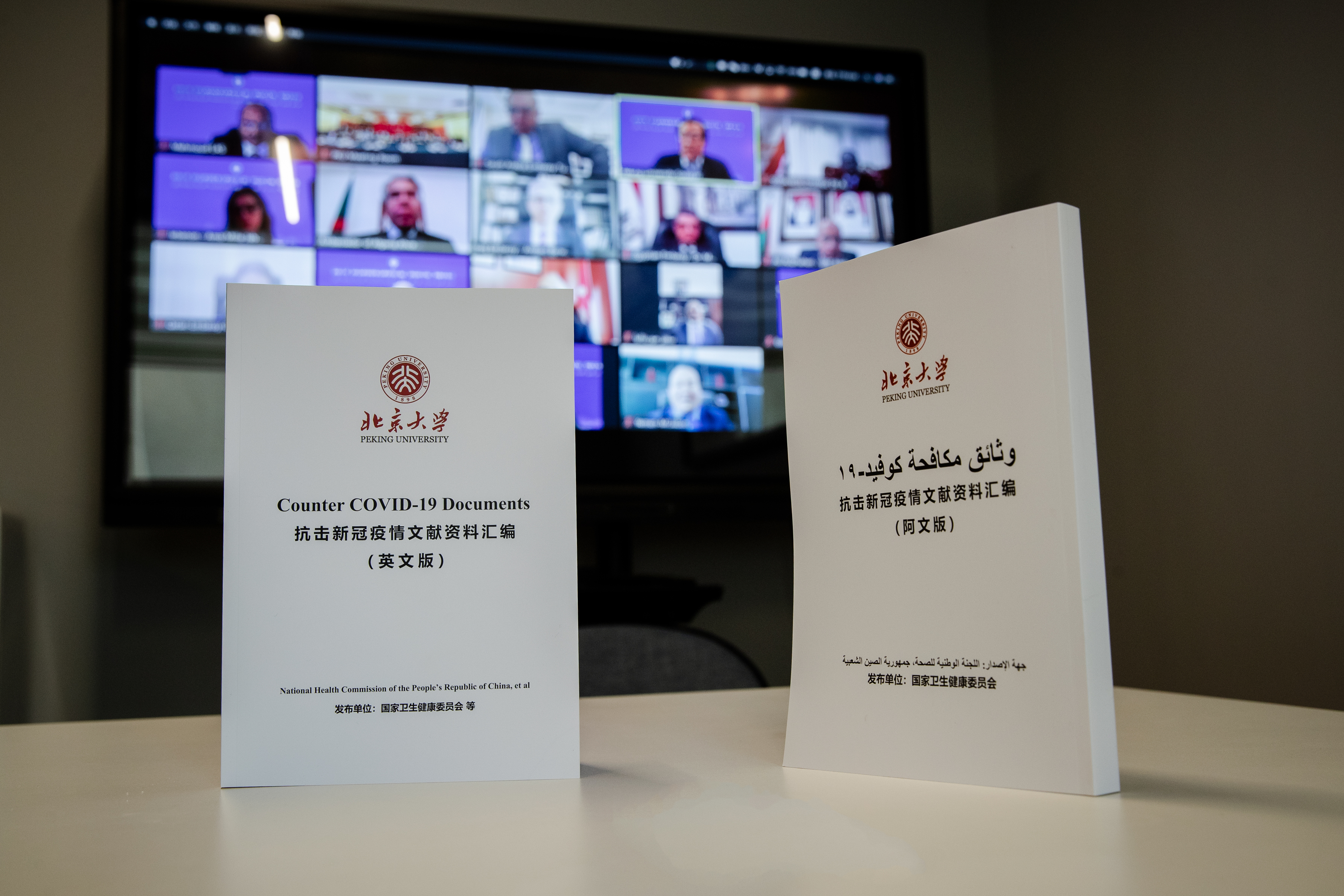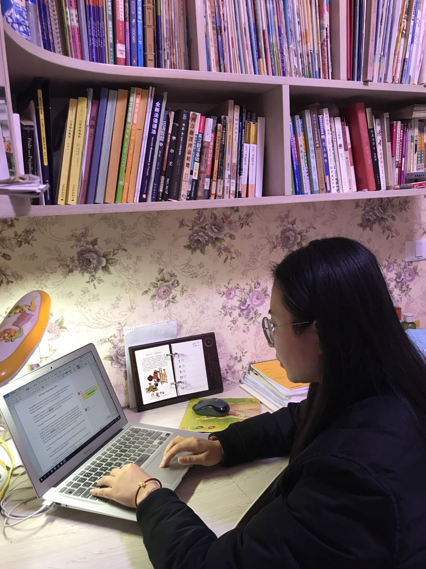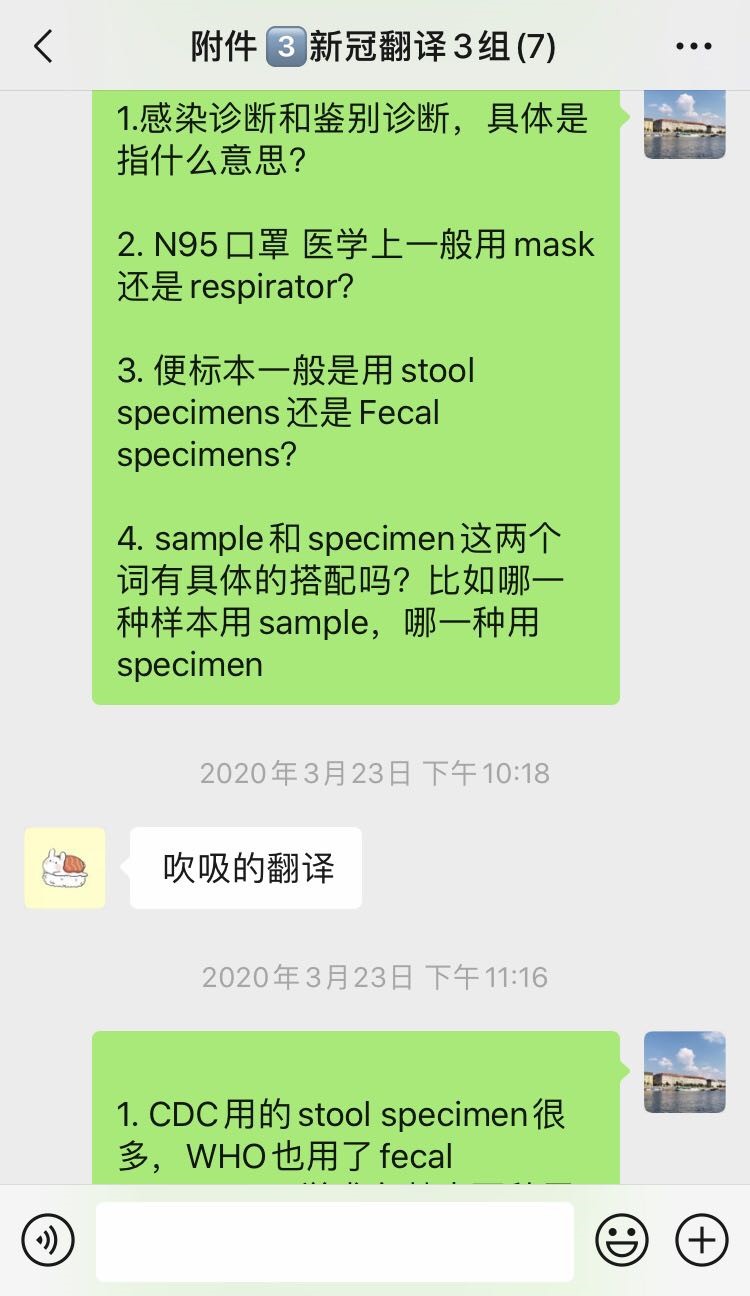Peking University, June 10, 2020: The COVID-19 pandemic has impacted all of our lives and it has been a daunting task for communities to find relevant information in their native tongue. As such, Peking University has established a team of volunteers who have pooled their expertise together and translated China's experience into 21 languages to help communities who may need this information.
 Counter COVID-19 Documents (English and Arabic versions)
Counter COVID-19 Documents (English and Arabic versions)
Following a video conference on sharing experiences in preventing and controlling the pandemic, Peking University and Qatar University jointly set up a special committee on March 19, with plenty of documents that required translating. However, there was a shortage of manpower. The School of Foreign Languages (SFL) swiftly established a volunteer team to translate Chinese epidemic control guidelines and multilingual COVID-19 terminology handbooks into foreign languages for various countries. On top of that, the students were also actively involved in translating medical supplies from various countries. Many students were willing to step up and contribute.
Led by academics from SFL, the team is made up of 64 students ranging from undergraduates to Ph.D. candidates and they have since translated these guidelines into 21 languages. Apart from those proficient in English, the team also comprises students well-versed in Arabic, Korean, Burmese and Indonesian. The team is capable of bilateral translation and they are able to interpret and translate both verbal and written medium. The team is also grateful to members of the PKU Health Science Center for their domain expertise. This synergy was what allowed the team to get through the translation in a seamless and efficient manner.
Tao Yemao, a Ph.D. candidate whose research interest lies in translation studies, is a leading member of the team. She is extremely heartened by the post-90s generation stepping up in their battle against COVID-19. By sharing China’s experience, Tao and her team members hope to harness the power of language to show solidarity with the rest of the world and to help the fight against COVID-19.
Tao has been passionate about English and foreign culture since she was young and she has always been fascinated by the intricacies of translating between languages. She believes that this passion is where a translator’s expertise and creativity come to life and it is definitely not an easy task.
 Tao revises a translated document
Tao revises a translated document
With the combined effort of the team, they have managed to translate and proofread 8 documents worth 120,000 words within the short span of 2 months. Tao revealed that based on her experience, translating an English book with 120,000 words alone usually takes 3 months while the team spectacularly took only a month for the actual translation. This efficiency has allowed them to gain precious time in aiding the global fight against the pandemic by sharing China’s experience with the global community.
In additon to the tight time constraints, the team also faced difficulties in standardizing the translation. Even though a style guide was established for the team to ensure a certain level of consistency in formatting and style, translation is ultimately a dynamic process and there were unforeseen circumstances that had to be ironed out. Members had to comb through the documents manually to spot any errors and to ensure that the translation was standardized. The whole process of translating a single document involved at least 10 steps from beginning to end to ensure that the translation was accurate. In fact, the final product was not just a compilation of various translations done by different students, but a coherent piece that the team took pains to finalize.
Despite the tight deadline, the team certainly did not compromise on the quality of translation. The team would often debate on the accurate choice of words to convey the message across effectively. With this sense of responsibility, the team sometimes debated whether to use "masks" or "respirators" and referred to academic papers and professionals (The collocation "N95 respirator" and "surgical masks" were most commonly used).
A group of voluntary translators identify and discuss their questions online
In addition, the team also ensured that the translation was localized and adapted to cater to various audiences. As most of the terms were highly technical, the team also consulted various corpora to ensure that the translation was done accurately. For example, the team referenced best-in-class translations from Handbook of COVID-19 Prevention and Treatment (Standard), which was compiled by the First Affiliated Hospital, Zhejiang University School of Medicine.
 Handbook of COVID-19 Prevention and Treatment (Standard)
Handbook of COVID-19 Prevention and Treatment (Standard)
One of the greatest obstacles that Tao faced was to translate a 20,000 word document. She was involved in the translation along with Liu Zhenwei and Shi Li from SFL, all of them being in charge of other translation tasks as well. It was a daunting task having to standardize the translation given the length of the document. However, the team was cognizant of the responsibility that they shouldered and took it upon themselves to actively coordinate and communicate any difficulties with one another. "Though the process was tiring, it gave us an immense sense of accomplishment when we completed it", says Tao.
The team established clear protocols regarding different stages of translation, thus ensuring the quality of the translation and to pre-empt any potential difficulties. Before the team started translating, they would (1) delegate responsibilities for translation and proofreading, (2) lay down clear deadlines for the draft, edited and finalized version and (3) establish a style guide. During the actual translation, the team would (1) search for parallel documents to compare with, (2) build a glossary for relevant terminologies, (3) consult relevant experts and finally, (4) discuss within the team. After translating the documents, the team would (1) proofread and give feedback, (2) run through the compiled document once more and (3) make any necessary edits based on feedback given by the experts. All the above-mentioned steps are not just a simple standard operating procedure (SOP) for the team. More importantly, all these steps are a reflection of all the valuable experiences gained throughout the process.
The team is extremely grateful to be given the chance to contribute to the fight against COVID-19. As Ning Qi, dean of the SFL, has mentioned, "Everyone is stationed across various battlefields in our common fight against the pandemic and our students would not sit by idly." On a professional note, this experience has also sharpened their translation abilities and they are currently in the process of doing an after action review. This experience has increased their appreciation of the beauty and power of translation and given them a deeper insight into what their discipline entails.
The translations have been well-received. Ambassadors of the United Arab Emirates and the Kingdom of Bahrain have all expressed their appreciation to Peking University’s translation team. The English and Arabic documents have been sent to 22 Arab countries, including Saudi Arabia, Qatar and Egypt. These are already being utilized by health departments, medical experts, higher education institutions and research institutes in these countries.
While the team is currently reflecting on their past experience and extracting best practices, Tao has also remarked that the situation remains fluid. Should there be a need for the team to start translating again, she is confident that the team would be able to leverage their experience and be even more prepared to translate technical terms in the future.
Written by: Ng Joong Hwee
Edited by: Huang Weijian, Ciara Morris



